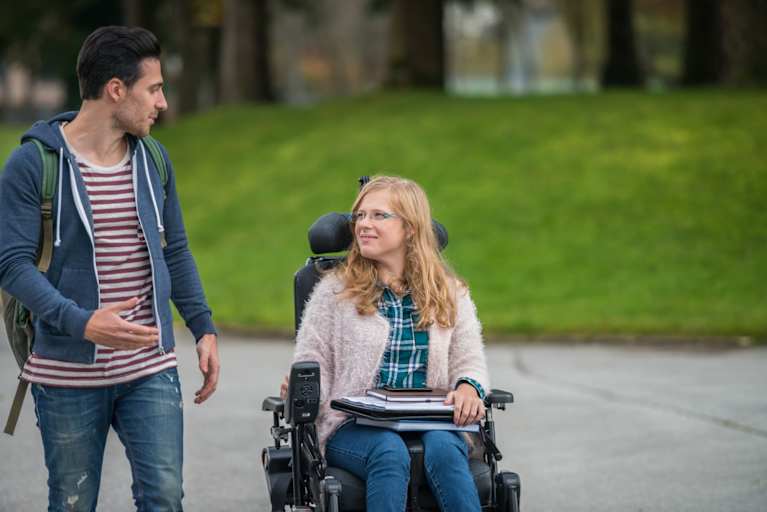What Does It Mean to Be Neurodivergent?
Estimates indicate that over 1.2 billion people identify as neurodivergent. “Neuro” refers to neurology, or the study of nerves and the nervous system, which includes the brain. “Divergent” recognizes that these cognitive profiles diverge from what is considered to be a “typical” cognitive profile. In a binary framework, those who aren’t neurodivergent are neurotypical.
Neurodiversity advocates may also refer to kinds of neurodivergence as neurotypes, differences, and variances, highlighting that while some brains are unlike what is considered more the norm, all are natural.
And though some may experience their neurodivergences as disabilities, neurodivergences are not necessarily disorders. Neurotypes that are often pathologized include dyspraxia, attention-deficit/hyperactivity disorder (ADHD), autism, dyslexia, and HSP.
What Challenges Do Neurodivergent Students Face?
Low Self-Esteem
Due to the medicalization of neurodivergence as a disorder and stereotypical media representation, neurodivergent people sometimes feel like they aren’t measuring up to others’ unfair standards. Many experience discrimination and bullying. In college settings, this can look like judgment from professors and peers if neurodivergent students request accommodations.
Lack of Support and Mentorship
Students who are neurodivergent often lack support, especially in universities that haven’t adopted a neurodiversity approach to teaching and assisting learners. Many struggle to connect with their peers and are left out of opportunities. Schools sometimes lack adequate disability services and accomodations.
And even when support and accommodations have been available, neurodivergent students sometimes lack guidance on how to apply the knowledge and skills they’ve learned in school to the professional world.
Social Interactions
Regardless of neurotype, people sometimes communicate differently from each other, which can lead to misunderstanding and frustration. These differences can be much greater when neurodivergent and neurotypical people interact with one another. Dr. Damian Milton, an autism researcher, describes the consequences of this divide as the double empathy problem.
In many cases, those with neurodivergences share certain lived experiences that may make it easier for them to empathize with each other. Similarly, neurotypical people may have the ability to more easily understand other neurotypical people. Because neurodivergent and neurotypical individuals may understand the world and express emotions differently, it can be difficult for them to empathize with each other.
Sensory Sensitivities
Under the social model of disability, adopted by neurodiversity advocates, “disability” is considered a social construct. People are disabled when their environments fail to adapt to their needs — disability is based on society’s operations and designs. High sensitivity is common for many people who are neurodivergent; many of us experience strong reactions to our sensory environment, which can be challenging when that environment does not fit with our sensory needs.
Inaccessible Classrooms
Neurodivergent people, who tend to learn differently than neurotypical people, can struggle in inaccessible classrooms. Accessibility in a classroom for a neurodivergent student might include reduced lighting, written instructions, transcripts and closed captions, exemption from group work and presentations, and speech that is honest and direct, devoid of hints and hidden meanings.
Resources to Understand and Navigate Neurodivergence
The Art of Autism
The Art of Autism is a nonprofit that “empowers autistic people and their families through participation in the arts” by advocating for neurodiversity and offering payment to neurodivergent poets and visual artists.
Tourettes Action
Founded forty years ago, Tourettes Action offers an extensive resource library, which contains their own publications as well as news, books, videos, and information on diagnosis.
Neurodiversity Resource Library
The Neurodiversity Resource Library offers a wealth of strategies for navigating the world as a neurodivergent person. The organization aims to “educate and empower” through their focus on the “neurodivergent employment cycle.”
Landmark College
Located in Putney, Vermont, Landmark College is a school exclusively for neurodivergent students. Neurodiversity advocate John Elder Robinson refers to the institution as “the college for our tribe.”
ADDitude
Though ADDitude’s main focus is ADHD, the website contains many resources on neurodivergence including information on dyspraxia, dyscalculia, and autism. Sign up for their newsletter and peruse their magazine and blog.
The Asperger/Autism Network
Founded in 1996, AANE aims to empower and build community, offering an abundance of resources, including events, research studies, a directory of diagnosticians, and a glossary of terms.
Planning Across the Spectrum
Planning Across the Spectrum provides financial planning services to disabled and neurodivergent people. They aim to enhance disabled and neurodivergent people’s quality of life by helping them pursue financial independence.
Neurodiversity is for everyone because everyone is neurodiverse. Just as there is no such thing as a “normal” racial or gender identity, there is no such thing as a “normal” brain. Neurodivergence is a natural neurological variation. While many types of neurodivergence are disabilities, they are not illnesses.
You may find college easier to navigate if you seek accommodations, learn how your brain works, and join a community of “neurokin.” You might even consider teaching your classmates and instructors about your brain, body, and needs. Neurodiversity makes a great topic for class projects.
Featured Image: PhotoAlto/Frederic Cirou / PhotoAlto Agency RF Collections / Getty Images




